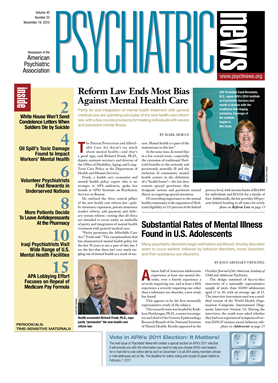The Family Bereavement Program (FBP), which aims to prevent psychiatric illness in children who had a parent die and in their surviving parent, has demonstrated improved mental health outcomes for at least six years after treatment was initiated, compared with other prevention approaches.
A psychiatric illness prevention program tailored for bereaved family members was found to provide long-term mental health benefits. The research design consisted of a randomized, controlled trial and compared two approaches—single-family counseling sessions and reading bereavement literature—among families in which a parent had died within four to 30 months before enrollment.
The study, conducted by Arizona State University researchers and published in the October Archives of Pediatric Adolescent Medicine, randomly assigned the children and parents to the FBP preventive treatment or a control group that used bereavement support literature rather than an active intervention. The study included 218 bereaved youth (aged 8 to 16) and 113 parents whose spouses had died, none of whom was currently receiving mental health or bereavement treatment services.
“Caregiver” was defined as a parent or other adult acting in a parental role. The FBP approach included 12 two-hour sessions for each family alone, led by master's-level clinicians, that focused on strengthening the quality of the caregiver-youth relationship and teaching developmentally appropriate skills (which were not specified) to strengthen the children's relationship with their caregiver. Additionally, the sessions sought to decrease the adults' mental health problems.
The literature control included bereavement books for youth and caregivers and a syllabus to guide their reading. Forty-two percent of caregivers reported reading at least half the literature, which could have included half of each book or half of the total literature provided, while 71 percent of children and 38 percent of young adults also reported reading at least half the literature.
At the end of the six-year program, interviews were conducted with 209 youths and 143 caregivers. Youth in the FBP program had significantly lower “internalizing” and “externalizing problems” as assessed by the Child Behavior Checklist, the Youth Self-Report, the Young Adult Behavior Checklist, and the Young Adult Self-Report, as reported by caregivers, the youth, and teachers. Parents in the FBP had lower depression scores (on the Beck Depression Inventory) than did those in the control group.
“Because externalizing problems in adolescence and young adulthood are associated with a wide array of social adaptation and mental health problems later in development, the current findings have significant public-health implications,” wrote Irwin Sandler, Ph.D., regent's professor in the Department of Psychology at Arizona State University and the study's lead author, and his colleagues.
Specifically, youth with low baseline untreated mental health problems in the FBP group were less likely to have mental disorders diagnosed throughout the six years during which they were followed, compared with other youth with low baseline untreated mental health problems in the control group.
Additionally, the program bolstered self-esteem, as measured by the Self-Perception Profile for Children at both the children's entry into the program and six years later. The authors noted that this finding is meaningful, given that poor self-esteem is a risk factor for depressive disorders in early adulthood.
The authors cautioned that the findings should not be generalized to the types of families who were excluded from the trial, including those already receiving mental health services. Also excluded were ethnic minority families and families that had experienced parental suicide.
